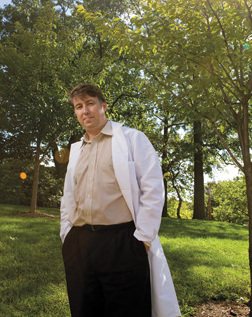 loading
loading
Light & VerityHow to build a better . . . everything Julie BrownGreen chemistry pioneer Paul Anastas is leading Yale's recent efforts in that field. View full imageOn average, for every pound of medicine produced, a ton of waste is generated. That fact alone might have been enough incentive for Yale to create its Center for Green Chemistry and Green Engineering. But Paul Anastas, the center's founding director, wants not only to clean up pharmaceutical and other manufacturing processes: he wants to build new ways to live in the twenty-first century. Anastas, who has worked in the Environmental Protection Agency and the White House Office of Science and Technology Policy, is widely known as the father of green chemistry—"the design of chemical products and processes that reduce or eliminate the use and generation of hazardous substances," as Anastas defines it. He cofounded the Green Chemistry Institute in 2004 and served as its director until 2006. Two years ago, Anastas was lured to Yale to launch the university's own initiative in the field. The center is a hub for research in the chemistry department as well as the environment and engineering schools, pursuing such innovations as hydrogen-based energy systems, biomaterials, biodiesel, and water purification. The center also oversees a course on green chemistry and one on greening business operations, and it has created textbooks on green chemistry and green engineering. Beyond that, says Anastas, is implementation—"working with industry and government to make it all real. Because chemicals constitute everything that we see, touch, and feel, everything that is the basis of our economy and our society, the applicability of the work of the center cuts across everything from cosmetics to agriculture to energy to packaging to drugs—you name it. So we work with a wide range of companies in designing the next generation of products and manufacturing processes." Anastas says his center's job is "identifying ways that ensure we will get increased quality of life and increased performance from our industry, in ways that preserve the things we can't live without. That is what green chemistry is doing every day."
The comment period has expired.
|
|